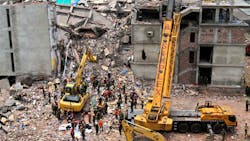Bangladesh to Decide Garment Wage Rise amid Unrest Fears
DHAKA - A government panel was striving Wednesday to reach agreement on a wage rise for Bangladesh's crisis-hit garment industry, amid warnings of fresh crippling strikes if the increase is too low.
The panel is trying to set a new minimum wage for four million garment workers, after factory disasters in recent months killed more than 1,000 people and highlighted the industry's appalling pay and conditions.
The government pledged to raise wages by November, based on the Minimum Wage Board's recommendation, after strikes last month saw hundreds of thousands of workers take to the streets, torch factories and clash with police to demand an increase.
"We expect to reach a final decision tomorrow," said M. Kamaluddin, a member of the six-person panel.
However he said negotiations within the panel -- which includes union officials and factory owners -- were still continuing over how much to increase the current monthly wage of 3,000 taka (US $38), which was last raised in 2010.
"Both sides have to make some concessions so that we can find a solution," Kamaluddin said.
Bangladesh is the world's second largest clothing exporter and the industry is a mainstay of the economy. But wages are well below those in other major garment-making nations such as China, Vietnam and Cambodia.
The collapse of the Rana Plaza factory complex in April that killed 1,135 people in one of the world's worst industrial disasters sparked pledges from leading Western retailers and the Bangladeshi government of improved conditions.
Owners' representative Arshad Jamal Dipu said that manufacturers were "ready to hike wages by around 50%."
Protests Possible
But union official Sirajul Islam Rony warned of fresh protests if owners did not agree to more than double the monthly wage to 8,114 taka.
"No way we'll agree a 4,500 taka minimum wage. The owners must offer more, otherwise workers will hit the streets again," he said.
Dipu said many factories could not afford to raise wages further than the current offer, pointing to a slump in orders from Western retailers.
Some factories have also been forced to spend heavily to fix fire and building safety problems at their factories following the Rana Plaza and other disasters.
The government of Prime Minister Sheikh Hasina, already facing down mass opposition rallies and protests, can ill afford another series of strikes ahead of elections.
Sources said Hasina might intervene at the last minute to fix a figure that pleases unions -- in an effort to woo voters in the country's largest workforce ahead of January elections.
The Minimum Wage Board's recommendation for a new wage must be approved by the government before becoming law.
Protests over poor wages, benefits and working conditions are frequent in Bangladesh but have gained in intensity since the April disaster.
Manufacturers and police said strikes in September hit production at more than 500 garment factories -- where clothes are made for top retailers such as Tesco and H&M -- costing owners some $40 million.
Copyright Agence France-Presse, 2013
For complete coverage of the Bangladesh garment industry, check out EHS Today, IndustryWeek's sister publication.
About the Author
Agence France-Presse
Copyright Agence France-Presse, 2002-2025. AFP text, photos, graphics and logos shall not be reproduced, published, broadcast, rewritten for broadcast or publication or redistributed directly or indirectly in any medium. AFP shall not be held liable for any delays, inaccuracies, errors or omissions in any AFP content, or for any actions taken in consequence.
